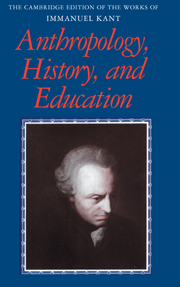Book contents
- Frontmatter
- Contents
- General editors' preface
- Preface
- General introduction
- 1 Observations on the feeling of the beautiful and sublime (1764)
- 2 Essay on the maladies of the head (1764)
- 3 Review of Moscati's work Of the corporeal essential differences between the structure of animals and humans (1771)
- 4 Of the different races of human beings (1775)
- 5 Essays regarding the Philanthropinum (1776/1777)
- 6 A note to physicians (1782)
- 7 Idea for a universal history with a cosmopolitan aim (1784)
- 8 Review of J. G. Herder's Ideas for the philosophy of the history of humanity. Parts 1 and 2 (1785)
- 9 Determination of the concept of a human race (1785)
- 10 Conjectural beginning of human history (1786)
- 11 Some remarks on Ludwig Heinrich Jakob's Examination of Mendelssohn's Morning hours (1786)
- 12 On the philosophers' medicine of the body (1786)
- 13 On the use of teleological principles in philosophy (1788)
- 14 From Soemmerring's On the organ of the soul (1796)
- 15 Anthropology from a pragmatic point of view (1798)
- 16 Postscript to Christian Gottlieb Mielcke's Lithuanian–German and German–Lithuanian dictionary (1800)
- 17 Lectures on pedagogy (1803)
- Editorial notes
- Glossary
- Bibliography
- Index
2 - Essay on the maladies of the head (1764)
Published online by Cambridge University Press: 05 May 2013
- Frontmatter
- Contents
- General editors' preface
- Preface
- General introduction
- 1 Observations on the feeling of the beautiful and sublime (1764)
- 2 Essay on the maladies of the head (1764)
- 3 Review of Moscati's work Of the corporeal essential differences between the structure of animals and humans (1771)
- 4 Of the different races of human beings (1775)
- 5 Essays regarding the Philanthropinum (1776/1777)
- 6 A note to physicians (1782)
- 7 Idea for a universal history with a cosmopolitan aim (1784)
- 8 Review of J. G. Herder's Ideas for the philosophy of the history of humanity. Parts 1 and 2 (1785)
- 9 Determination of the concept of a human race (1785)
- 10 Conjectural beginning of human history (1786)
- 11 Some remarks on Ludwig Heinrich Jakob's Examination of Mendelssohn's Morning hours (1786)
- 12 On the philosophers' medicine of the body (1786)
- 13 On the use of teleological principles in philosophy (1788)
- 14 From Soemmerring's On the organ of the soul (1796)
- 15 Anthropology from a pragmatic point of view (1798)
- 16 Postscript to Christian Gottlieb Mielcke's Lithuanian–German and German–Lithuanian dictionary (1800)
- 17 Lectures on pedagogy (1803)
- Editorial notes
- Glossary
- Bibliography
- Index
Summary
EDITOR'S INTRODUCTION
In late 1763 and early 1764 a Polish religious fanatic by the name of Jan Pawlikowicz Zdomozyrskich Komarnicki, who traveled in the company of a little boy and a herd of cows, sheep, and goats, took his sojourn outside of Königsberg and attracted widespread attention. After a serious illness and a visionary experience provoked by twenty days of fasting, the “goat prophet,” as he became known in Königsberg, had vowed to undertake a seven-year pilgrimage, of which two years remained to be served at that time. Kant's former student and friend, Johann Georg Hamann, published a report about Komarnicki in the Königsbergische Gelehrte und Politische Zeitungen (Königsberg Learned and Political Newspaper), of which he was the editor (issue No. 3 of 1764). The report referred to the “goat prophet” as an “adventurer” (Abenteurer) and gave a critical portrayal of the man's religious comportment Hamann’s report was followed by an anonymous assessment: “According to the judgment of a local scholar, the most remarkable thing in the above note about the inspired faun and his lad, for such eyes as gladly spy out raw nature, which commonly becomes very unrecognizable under the discipline to which human beings are subjected, is – the little wild one, who grew up in the woods, has learned to bid defiance to all hardships of weather with a joyful liveliness and whose face displays no vulgar frankness and has nothing about it of the stupid embarrassment which is an effect result of servitude or of the forced attentiveness in finer education; and, to be brief, who seems to be (when one takes away that in which a few people have already corrupted him, by teaching him to ask for money and to enjoy sweets), a perfect child in that understanding in which an experimental moralist could wish it, one who would be reasonable enough not to count the words of Herr Rousseau among the beautiful phantoms until he had tested them..
- Type
- Chapter
- Information
- Anthropology, History, and Education , pp. 63 - 77Publisher: Cambridge University PressPrint publication year: 2007
- 3
- Cited by

